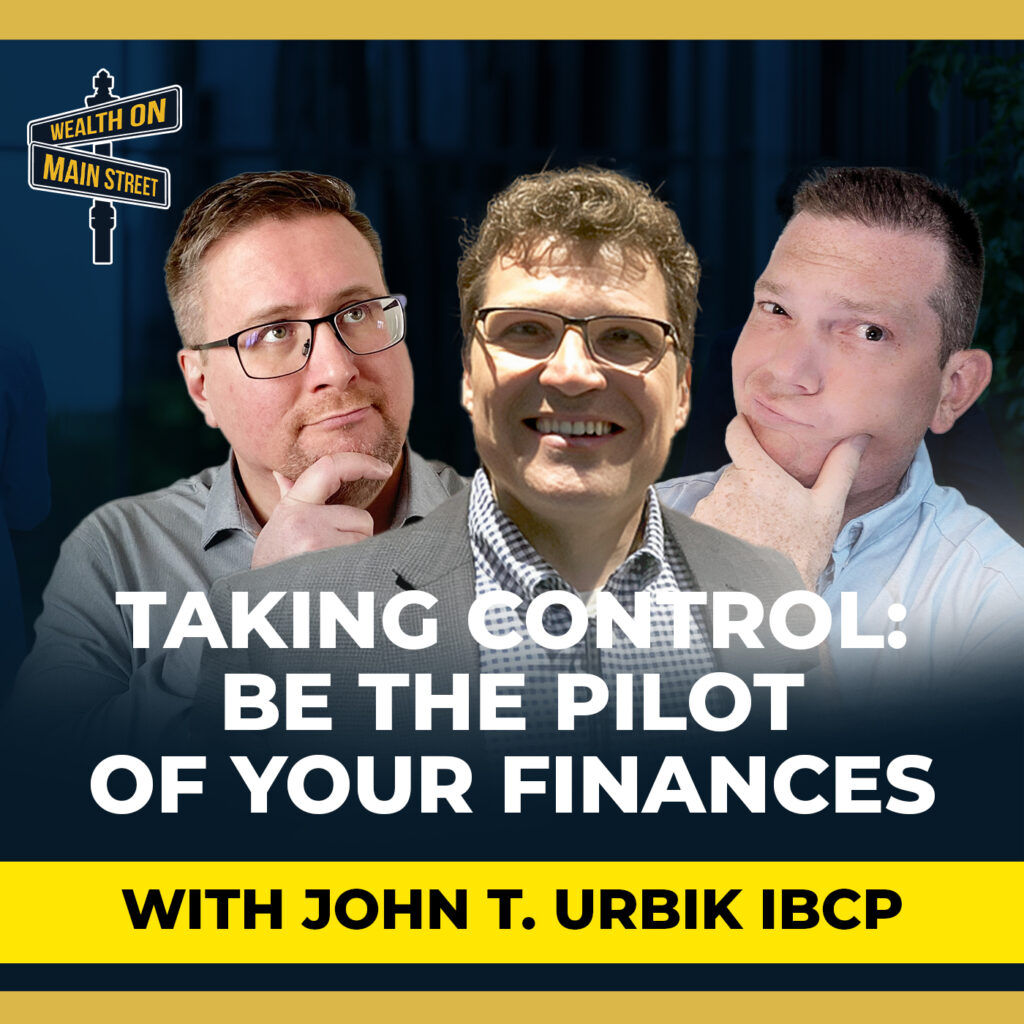
Wealth On Main Street 284: Taking Control: Being the Pilot of Your Finances with John T. Urbik IBCP
You are the pilot of your own financial aircraft. If you don’t take the controls, someone else will, often without your best interests in mind.
Thousands of hours logged in the cockpit. Countless missions flying B-52 bombers through war zones. In this episode of the Wealth On Main Street podcast, Richard Canfield and Jayson Lowe sit down with John T. Urbik, IBCP, to explore how lessons from aviation translate to better financial decision-making.
The insights from this episode show you how to stop flying blind and start navigating with confidence using the Infinite Banking Concept (IBC).
From emergency protocols and situational awareness to building your own financial “flight plan,” it’s a mindset shift that puts control, clarity, and calm right back in your hands.
Let’s jump into the key flight lessons you need to become the captain of your financial life, not just a passenger.
Your Financial Life Needs a Flight Plan
In aviation, nothing happens by chance. Every flight requires a detailed plan—from destination and weather to fuel calculations and emergency procedures.
As John shares, your finances deserve the same intentionality. Without a flight plan, pilots risk getting lost or worse. The same is true for your money.
“Most people don’t know where they’re going financially,” John says, and that’s a problem. If you’re not steering your financial course, you’re likely headed toward turbulence or relying on someone else who doesn’t fully understand your goals.
Creating a financial flight plan means having clarity on your destination: What does financial freedom look like for you? Is it retiring early, building generational wealth, or funding your kids’ education without stress?
Once you define your goals, you reverse-engineer the path to get there, using systems like Infinite Banking to navigate confidently.
Just like a flight plan includes checkpoints, your financial plan should include regular reviews and course corrections. Life will throw unexpected storms your way.
When you have a plan, you don’t panic. You adjust.
John emphasizes that a good plan is not static. It evolves as your life evolves. And most importantly, it’s your plan. Not your employer’s. Not your bank’s. Not your financial advisor’s.
“If you don’t take command of your finances,” John warns, “someone else will. And they may not land the plane safely.”
Situational Awareness Prevents Financial Crashes
One of the most critical skills a pilot must master is situational awareness. Understanding what’s happening around you, anticipating risks, and making decisions accordingly. As John explains it is the same principle applies to your financial life.
“It’s not what you don’t know that gets you,” John says. “It’s what you think you know that just isn’t so.”
Too often, people operate on outdated financial assumptions. Believing their retirement plan is safe, or assuming their advisor has it all under control. But that’s how financial crashes happen: from blind spots and false security.
Situational awareness in finances means knowing exactly where your money is, how it’s working (or not), and what risks are on your radar.
Are your investments aligned with your goals? Are you over-leveraged? Do you understand the impact of inflation, taxes, or rising interest rates on your cash flow?
Just like a pilot constantly scans the instruments and outside environment, you need to check in regularly with your financial dashboard. That means asking better questions, evaluating real-time data, and avoiding complacency.
John encourages building your “financial cockpit”—a clear view of your assets, liabilities, income, and insurance.
The Infinite Banking Concept supports this awareness because it forces you to be proactive. You’re not reacting to a market dip. You’re building capital steadily, with intention. That shift puts you back in command.
With the right tools and mindset, you avoid costly surprises and navigate uncertainty with confidence. As John reminds us:
“Situational awareness is the difference between a safe landing and a disaster.”
Infinite Banking: Zero-Stress Strategy Backed by Real Stories
While theory is great, it’s the actual stories that prove the concept works, and they prove it with zero stress.
John recalls a client who faced a medical emergency and needed immediate access to funds. Because he had built up cash value in his IBC policy, there was no need to liquidate assets or jump through hoops.
“Within a couple of days, the funds were in his account,” John says. “No bank manager approval, no credit check, no delay.”
The client could focus on what mattered because his financial system was built for resilience.
Another story involves a business owner who needed capital for a growth opportunity. Rather than taking out a high-interest loan or diluting equity, he accessed funds through his policy.
He got the cash quickly and on his own terms. Then paid it back at a pace he controlled, all while his policy continued to earn uninterrupted growth.
These stories aren't one-offs. They reflect a repeatable, reliable system that works for people across various income levels and life stages.
Stress-free money isn’t about having millions. It’s about having a plan that eliminates friction, delays, and dependency.
IBC puts you in control.
As John emphasizes, control breeds peace of mind. “When life throws turbulence your way, you can respond, not react. That’s the power of being your own banker.”
Qualified Plans vs. Infinite Banking Control
The most eye-opening comparisons John shares are between traditional qualified plans—like 401(k)s, RRSPs, and IRAs—and the Infinite Banking Concept.
Most people rely heavily on these qualified plans without fully understanding the trade-offs. “You’ve got to ask yourself,” John says, “who's really in control?”
With a qualified plan, the government makes the rules. You can’t access your money without penalty until a certain age. You’re often limited in your investment choices.
When you do withdraw funds, you pay taxes at whatever rate the government chooses in the future. There’s also exposure to market risk, and often, your money is managed by someone who doesn’t know your full financial picture.
In contrast, Infinite Banking gives you control over your capital from day one.
You decide when to access your money, how to use it, and when you want to pay it back. Your policy continues to grow even when you borrow against it, and the terms are yours to define, not the government’s.
This isn’t just about flexibility. It’s about sovereignty.
With IBC, your money doesn’t live in a box controlled by shifting regulations. It resides in a system you built, understand, and command.
John reminds us, “Qualified plans teach you to defer life—Infinite Banking teaches you to fund it.”
If your goal is financial independence, then Infinite Banking doesn’t just offer a path forward. It gives you the wheel.
The Role of a Financial Co-Pilot
Even the most experienced pilots have co-pilots. Not because they can’t fly alone—but because they know the value of having a second set of eyes, someone who understands the mission and can offer support, insight, or take over when needed.
Your financial journey is no different.
John explains, being the captain of your finances doesn’t mean doing it all by yourself. It means building a crew you trust.
That includes a qualified financial co-pilot.
Someone who helps you execute your vision, not impose theirs. Someone who brings clarity, not confusion.
“If I’m a consumer out there and I’m looking for good financial advice,” John says, “I’m going to delegate this to someone I trust—like Richard or Jayson—because I need a good co-pilot, a good air traffic controller, a good captain, a good maintenance guy.”
Your co-pilot should help you understand the Infinite Banking Concept in depth, show you how to structure your policies correctly, and walk you through every important financial decision without taking the controls away from you.
The relationship is collaborative, not controlling.
Too many people hand over the yoke to financial professionals who don’t explain the plan, can’t answer tough questions, or prioritize their own commissions over your outcomes. That’s not a co-pilot—that’s a hijack.
Build your team with intention.
Choose advisors who empower you to stay in the captain’s chair.
The right co-pilot doesn’t fly the plane for you. They make sure you land exactly where you want to go, safely and successfully.
Letting Go of Past Financial Turbulence
What matters isn’t avoiding it altogether, but knowing how to stay steady, course correct, and not let fear dictate the rest of the flight. The same applies to your financial past.
Many people hesitate to take control of their money because they’re carrying guilt, shame, or frustration from previous financial decisions.
Maybe it was debt, a bad investment, or years of not paying attention. But as John explains, your past doesn’t define your future unless you let it.
“There’s a lot of freedom in just letting go of what didn’t work,” John says. That freedom comes from choosing to lead your financial life today with better tools, information, and a renewed mindset.
Letting go doesn’t mean ignoring mistakes. It means learning from them and building new habits with intention.
That’s where Infinite Banking comes in. It’s a framework for regaining confidence, consistency, and clarity.
John reminds us that pilots don’t abandon the flight because of a rough patch. They make adjustments, rely on their instruments, and move forward.
You can do the same. Create a new plan. Build new systems. Choose to lead.
Give yourself grace. Your past financial turbulence was real, but it doesn’t have to be repeated. What matters is what you do next.
When you decide to sit in the captain’s seat, you take that power back. One decision at a time.
The Captain's Chair Comes With Responsibility
There’s a reason not everyone becomes a pilot: it requires leadership, skill, and the willingness to take full responsibility for what happens under your command.
John points out, “The captain’s chair comes with responsibility.” It’s owning the outcomes, both good and bad.
While that level of responsibility can be intimidating, it’s also what unlocks real freedom.
In today’s world, it’s easy to offload financial decisions to others. You rely on employers for retirement plans, banks for loans, and advisors for investment choices.
But when you outsource everything, you give away your power and your ability to make proactive decisions.
Taking the captain’s is committing to understanding the basics, asking the right questions, and staying engaged. It means taking control of your cash flow, building your personal banking system, and being accountable for where your money goes.
With Infinite Banking, the responsibility is real, but so is the reward. You create your system. You determine how it’s used. You decide how and when to access capital. And you pass that example down to your family.
The captain’s chair may not be the easiest seat. But it’s the one with the best view.
It’s the only one that lets you navigate toward the financial future you actually want, instead of drifting wherever someone else decides to take you.
Conclusion
It’s time to stop flying on autopilot. Your financial life is too important to leave in the hands of institutions, market forces, or outdated advice.
You don’t have to be a financial expert to lead your money well. What you do need is clarity, commitment, and the willingness to chart a better course.
Infinite Banking offers a proven system to regain control, build wealth with intention, and respond to life’s turbulence with calm and confidence.
Every great journey begins with a decision.
Today, you have the chance to change direction, upgrade your financial instruments, and steer toward a future defined by freedom, not fear.
File the plan. Trust your instruments. And take off.
The skies are waiting. And they’re yours to navigate.
For more information, watch the full episode here and grab a copy of Don’t Spread the Wealth. Discover how to make the infinite banking concept work for you.
ORDER A COPY OF OUR BOOK!
Don’t Spread the Wealth: How to Leverage the Family Banking System to Own All the Gold, Make the Rules, and Enjoy Generational Riches https://www.amazon.ca/Dont-Spread-Wealth-Leverage-Generational-ebook/dp/B0CW19QSGT/
Website: https://dontspreadwealth.com/
🎙️ WEALTH ON MAIN STREET LINKS:
Learn how Canadians are Implementing Infinite Banking for Free Here:
https://www.ascendantfinancial.ca/ibc-wwbs/?LeadSourceId=427
Podcast Website: https://wealthwithoutbaystreet.com/
Follow us on Facebook:https://www.facebook.com/wealthonmainstreetpodcast
Subscribe to our Youtube Channel: https://www.youtube.com/channel/UCj8ZlieHodxhD0vC75-rq0g
Book a 15-minute call: https://www.ascendantfinancial.ca/schedule/?LeadSourceId=427
Watch our Tribute To The Man Who Created Infinite Banking R. Nelson Nash here:
🤝 Join Our Community! https://www.facebook.com/groups/wealthwithoutbaystreet/
📚 IBC RECOMMENDED BOOKS
📽️ WATCH THE DOCUMENTARY
Documentary Film This is Nelson Nash: https://www.ascendantfinancial.ca/nelson-nash-film/
💸 Financial Advisor? Learn about the Infinite Banking Concept here: Nelson Nash Institute Practitioner Program: https://infinitebanking.org/practitioners-program/ref/6/EVA – Economic Value Add The Real Key To Creating Wealth Article: https://infinitebanking.org/the-real-key-to-creating-wealth/ref/6/

